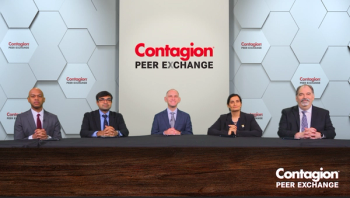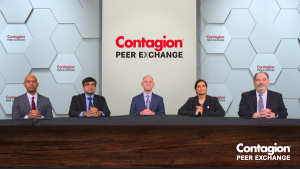
To close the discussion, experts on C. difficile infections discuss how they talk with patients about fecal microbiota transplantation.

To close the discussion, experts on C. difficile infections discuss how they talk with patients about fecal microbiota transplantation.

Members of the panel discuss when and where they tend to utilize fecal microbiota transplantation for recurrent C. difficile infections in clinical practice.

Experts on the treatment of patients with C. difficile infections provide insights on the implementation of fecal microbiota transplant products into clinical practices.

The panel provides insights on common adverse effects associated with fecal microbiota transplantation and analyzes the possibility of FMT products carrying pathogens or food-borne allergens.

Paul Feuerstadt, MD, FACG, AGAF, discusses the key findings from the phase 3 ECOSPOR clinical trial for fecal microbiota spores, live-brpk oral capsules (VAS).

Sahil Khanna, MBBS, MS, discusses the effectiveness of live-JSLM (RBL) in preventing the recurrence of C. difficile infections.

Matthew D. Sims, MD, PhD, FACP, FIDSA, discusses how fecal microbiota transplantation therapies are administered and shares his clinical experience.

Carl V. Crawford, MD, provides a comprehensive overview of the two FDA-approved FMT therapies for patients with recurrent C. difficile infections.

The panel review data from foundational studies on fecal microbiota transplantation in patients with C. difficile infections.

A panel of experts on C. difficile infections discusses risks associated with antibiotic use, including vancomycin-resistant enterococci infections.

Focusing on the treatment of patients with C. difficile infections, Carl V. Crawford, MD, provides clinical insights on medication tapering practices and therapies being utilized by clinicians.

Matthew D. Sims, MD, PhD, FACP, FIDSA, discuss how antibiotics do not completely eliminate C. difficile infections, the drivers of recurrence, and new treatments that are addressing eubiosis and C. difficile spores.

Experts on C. difficile infections give an overview of the ACG and IDSA/SHEA treatment guidelines for initial infection, first recurrence, and subsequent recurrences.

Paul Feuerstadt, MD, FACG, AGAF, provides clinical insights on diagnostic testing practices for C. difficile infections, highlighting the EIA, GDH, and PCR assays.

Sahil Khanna, MBBS, MS, outlines patients at risk for recurrent C. difficile infections, and Teena Chopra, MD, MPH, FACP, FIDSA, FSHEA, focuses on environmental considerations that can help prevent transmission.

Carl V. Crawford, MD, outlines the risk factors for C. difficile infections, focusing on factors that affect the body’s microbiome or immune system, including antibiotics, age, comorbid conditions, exposures, and prior C. difficile infections.

Teena Chopra, MD, MPH, FACP, FIDSA, FSHEA, and Matthew D. Sims, MD, PhD, FACP, FIDSA, provide clinical insights on the rate of recurrence of C. difficile infections and the impact on patients.

A panel of experts provide an overview of the epidemiology of Clostridioides difficile infections, highlighting diagnostic practices and the role of antimicrobial stewardship.

Published: October 7th 2024 | Updated:

Published: September 16th 2024 | Updated:

Published: September 9th 2024 | Updated:

Published: October 21st 2024 | Updated:

Published: August 27th 2024 | Updated:

Published: September 30th 2024 | Updated: